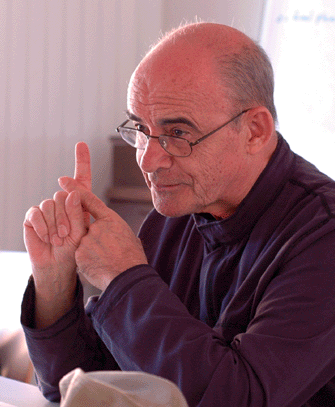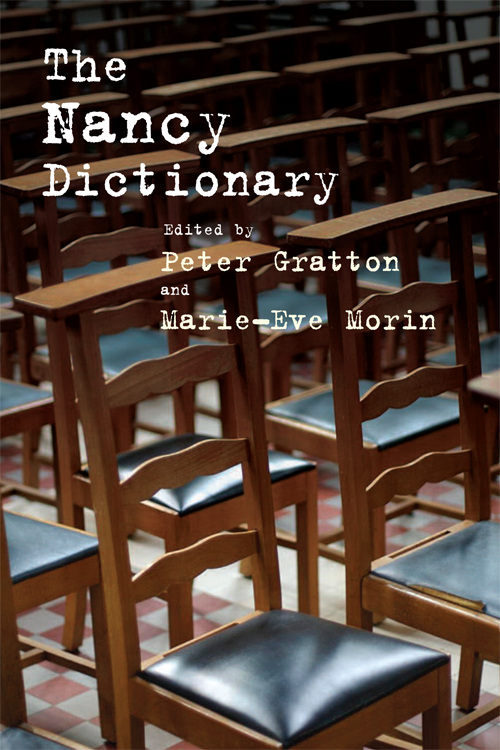
By Catherine Kellogg
The definition of Love from The Nancy Dictionary, the first dictionary dedicated to the work of French philosopher Jean-Luc Nancy. Happy Valentine’s Day from Edinburgh University Press.
For Jean Luc Nancy, in the occidental tradition, love is an experience that appears to be peculiarly invested with the kind of immanence – the dream of being perfect, total, absolute – no longer guaranteed by a supreme being. In this sense, throughout his writings, Nancy is clearly talking about something other than, or at least not identical to, the representation of the experience of erotic love: he is also talking about the intimate association between love and thought (and he talks about its ‘origins’ in the word ‘philosophy’ itself). The love of thought and the thought of love are perfectly congruent. Both the tradition of occidental love and the tradition of occidental thought, then, promise fulfilment, perfection, wholeness; a reunion with a lost original unity.

Indeed, Nancy demonstrates the profound complicity between the double-ness of the idea of love (love is completion and the striving towards completion, love is journey, love is return, love is the encounter with alterity, love is complementarity, love is enslavement, love is freedom or transcendence, and so on) and Western philosophy. Love, he proclaims, is conceived of as the identity of identity and difference; it is the thought of the dialectic crystallised perfectly in G. W. F. Hegel’s (1770–1831) claim that ‘The Absolute wishes to be close to us’: God is love and God is the supreme being. The thought of love, then, as the thought of Being, of perfection, of return, and thus as freedom or transcendence, is the thought of meaning qua meaning.
Nancy points out, however, that in love we find ourselves shattered; love does not deliver absoluteness, it does not produce a perfect reunion. Rather, love is an experience of the impossibility of pure immanence (jouissance). This is because in love, we are actually always drawn up out of the narcissistic circle of our notions of perfection, of completion and of return. Nancy says, we are broken by love; in love we find ourselves beyond ourselves, in excess to ourselves. Our experience of love exposes us to being jarred out of the very perfection love seems to promise. As he says, rather beautifully,
The heart is not broken, in the sense that it does not exist before the break. But it is the break itself that makes the heart. The heart is not an organ, and neither is it a faculty. It is: that I is broken and traversed by the other where its presence is most intimate and its life most open. The beating of the heart – rhythm of the partition of being, syncope of the sharing of singularity – cuts across presence, life, consciousness. That is why thinking – which is nothing other than the weighing or testing of the limits, the ends, of presence, of life, of consciousness – thinking itself is love.
– The Inoperative Community (IC), 99
What the other (whom we love) presents to us, Nancy argues, is the fact of her existence, which is to say, a being of mortality and finiteness. Love here, then, is not a matter of communion or return. Indeed, it is commonplace to acknowledge that what provokes love is the other’s singularity – the je ne sais quoi that attracts us to another. Indeed, for Nancy, in love, we are confronted directly by our own remains; in love, as he says,
‘I can no longer, whatever presence to myself I may maintain . . . pro-pose myself to myself without remains, without something of me remaining, outside of me.’
– IC, 97
Furthermore, in all of its endless variations, love comes to us always singularly. This is why love’s own (secret) name is the statement ‘I love you’. Love’s name must carry both the ‘I’ and the ‘you’ because all loves, so humbly alike, as Nancy says, ‘from the sole embrace . . . to tireless devotion . . . are all superbly singular’. Perhaps more significantly, Nancy says that, notwithstanding its exhaustion, the statement ‘I love you’ is a promise that ‘draws itself back before the law that lets it appear’ (IC, 100). The paradox at the heart of the statement ‘I love you’ is that, on the one hand, love cannot guarantee itself. As Nancy says,
‘It is possible that one day I will no longer love you, and this possibility cannot be taken away from love – it belongs to it. It is against this possibility, but also with it, that the promise is made, the word given.’
– IC, 100.
On the other hand, it is the very inability to guarantee love – the very ephemerality of the experience of loving – that calls forth the promise of love in the first place.

What Nancy has done here, then, is to invoke the statement ‘I love you’ along with a question of the nature of promises, and what he calls a law. The statement ‘I love you’, he says, is a limit of speech, and this much, at least, seems clear. As a statement most often uttered in moments at the limits of meaning, it is powerless, it can do nothing. What is promised – that I love you – cannot possibly be guaranteed. But he goes on to say that this promise lets emerge the law that love must arrive. What he gestures towards here is the insight that all forms of signification participate in the dramatics of what is not-yet, but promised in meaning. Signs literally take the place of missing referents, and in this sense signification, while naming a ‘presence’, is always already pointing beyond itself towards what is not and cannot be present. In this sense, there is always an ‘opening’ or a beyond that makes any signification possible. And yet, all signification happens ‘on the scene of presence’; it names a presence that is simultaneously belied by the process of signification itself. What is announced by signification is the promise of what is not-yet, but promised in meaning: this will be. And insofar as it is said, the phrase ‘I love you’ also participates in the law of the given word: this love will be. In this sense, Nancy tells us that love always ‘arrives in the promise and as the promise’. What is promised is that I love you. That it can be promised is what he calls the law, the law of the spoken word: this will and must be.
The thought of love, then, the thought of perfection, return, transcendence, is the thought of meaning as such. But the experience of love, its ability to bring us to what is most peculiar or singular about ourselves and each other, brings us to the limit of speech or meaning. What the experience of love shatters, then, is the thought of love, the idea of an immanent or perfect meaning. Both thought and love, then, ‘take place in the reticence that lets the singular moments of this experience offer and arrange themselves’ (IC, 84). Both thought – this thought or that thought – and love – this love or that love – are what takes place, happens, as impossible happenings, in the reticence, retracing or retreat of meaning as such, in the retracing/retreat of pure immanence.

LOVE by Catherine Kendall
An Extract from The Nancy Dictionary
Edited by Peter Gratton and Marie-Eve Morin





